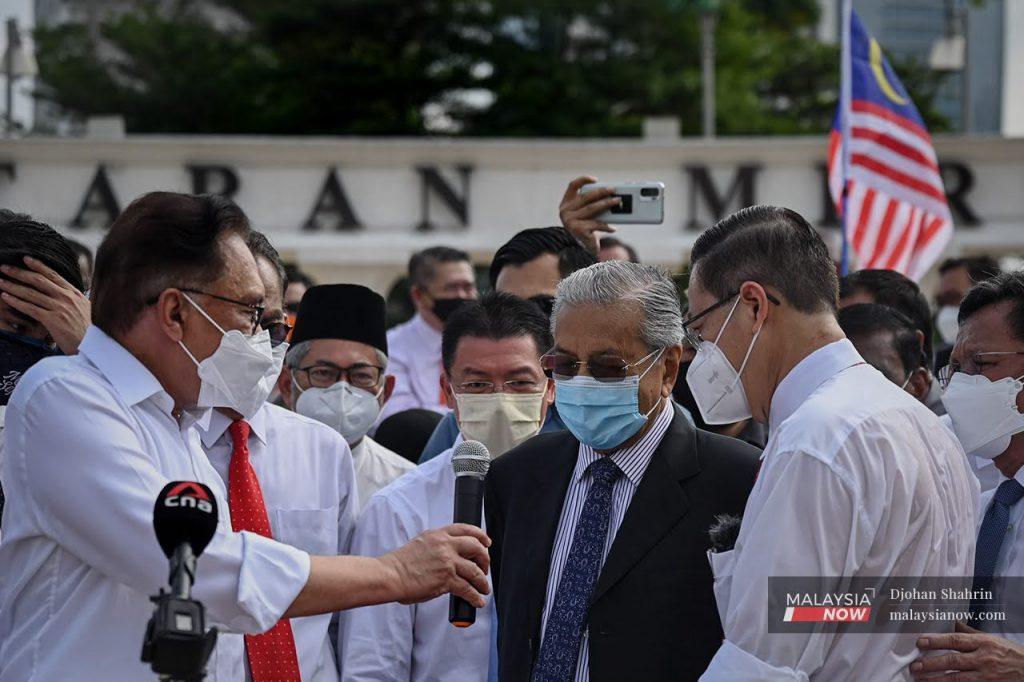PKR-Amanah spat over Anwar spreads to Penang
Conflict continues over the PKR chief's leadership following PH's failed bid to regain federal power.
Just In
Disagreements over the leadership of Pakatan Harapan (PH) chairman Anwar Ibrahim which surfaced in a recent dispute between Amanah’s Bukit Bintang division and a pro-PKR activist in Sarawak appear to have spread to Penang, where leaders from the two component parties have locked horns over the direction of the opposition pact.
Tanjong Amanah Youth chief Faruk Abdul Rahman agreed with Bukit Bintang leader Ahmad Asri Talib who had called for a change of leader and the formation of a PH Plus coalition.
But several Penang PKR Youth leaders said they regretted Faruk’s remarks which they described as unhealthy and non-beneficial.
“The statement uploaded on his Facebook on Aug 21 was most disappointing.
“It appears as though he has forgotten how PH which obtained the mandate of the people collapsed due to the betrayal and self-interest of the prime minister at the time who resigned without discussing the matter with party chiefs in the PH Presidential Council,” they said in a statement signed by the youth chiefs of Balik Pulau, Tasek Gelugor and Bukit Mertajam, as well as the chairman of the central education bureau.
Faruk, in a Facebook post, had urged PH leaders to meet and to choose a new chairman and opposition chief.
He also suggested Dr Mahathir Mohamad for the post, saying he was the most qualified candidate.
“We should raise up a leader like Mahathir who is widely experienced in the country’s politics,” he said, adding that this was not to downplay the efforts and determination of Anwar whom he said had fought to the end for the mandate of the people.
“However, he has yet to obtain enough support,” he said.
In their statement today, the PKR Youth chiefs criticised Faruk’s stand, questioning Mahathir’s integrity in his leadership of PH.
“If the candidate he suggests to lead PH was truly serious about helming the coalition, he would not have made decisions without holding discussions first,” they said in a reference to Mahathir’s move to step down at the peak of PH’s leadership crisis last year, triggering the so-called Sheraton Move.
The PH government subsequently collapsed and was replaced by the Perikatan Nasional (PN) administration led by Bersatu president Muhyiddin Yassin.
The PKR Youth chiefs also advised Faruk to self-reflect and called for an increase in inter-party cooperation, saying any move by PH component parties to go it alone should not be accepted.
“PH’s victory and strength depends on all of its component parties,” they said.
“It would be unfair to see Anwar’s failure to obtain the necessary support as one that would require a change of chairman.
“Has Faruk forgotten Anwar’s service and the sacrifices he made to strengthen the opposition coalition?”
Yesterday, MalaysiaNow reported that conflict had arisen between several leaders from Amanah and PKR following the pact’s failed bid to take over federal power.
Anwar, Umno president Ahmad Zahid Hamidi and former prime minister Najib Razak had led efforts to oust Muhyiddin, who resigned after losing his fragile majority due to the withdrawal of support by a group of Umno MPs.
Muhyiddin was replaced by Ismail Sabri Yaakob who was sworn in as the country’s ninth prime minister on Aug 20 with the support of 114 out of 220 MPs.
Yesterday, PH leaders reiterated that they would remain under Anwar’s leadership, maintaining that 105 MPs had backed the PKR president for prime minister.
They also said they would extend cooperation with other opposition blocs to work under what they called the “big tent” approach.
Subscribe to our newsletter
To be updated with all the latest news and analyses daily.
Most Read
No articles found.
